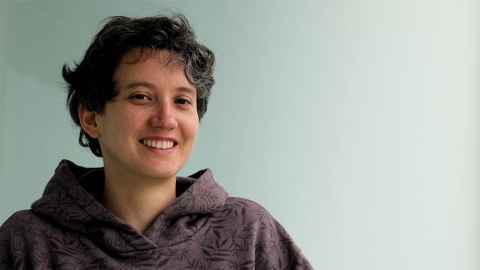Take 10 with... Alice Della Penna
Dr Alice Della Penna, Lecturer at the Institute of Marine Science, gives us 10 minutes of her time to discuss her research into how marine organisms respond to changes in their environment.

1. Describe your research topic to us in 10 words or less.
How marine organisms are influenced by their dynamic fluid environment.
2. Now describe it in everyday terms!
In most terrestrial ecosystems the landscape that plants and animals inhabit changes very slowly compared their typical lifetimes. By contrast, in the marine environment currents can change the distribution of animals and plants, and the resources they need, on time scales that are very short. Sometimes the “seascape” can change on temporal scales that are equivalent to having a forest moving of a couple hundreds of kilometres in a week or two!
3. What are some of the day-to-day research activities you carry out?
My day-to-day activities vary quite a lot, and that’s something I enjoy about my work. Most days I’m looking at my computer, monitoring and analysing satellite images or sonar data or working on a model. Or I’ll be preparing for a research survey, or, even better, I may be on a research vessel, collecting water samples or lowering sensors to measure temperature, salinity or fluorescence. I also spend a lot of time interacting with students, and other scientists.
4. What do you enjoy most about your research?
I enjoy the variety of what I do, as well as being able to keep learning something new (and often quite unexpected) every day.
5. Tell us something that has surprised or amused you in the course of your research.
I’m not particularly proud of this one, but it’s still one of my favourite memories. During my PhD I worked a lot with satellite data, using them to locate the position of fronts (regions where waters having different characteristics meet) and it took a few years before I encountered one in the field. I had used satellites to estimate the position of such small fronts and spent quite a lot of time trying to be accurate. I remember clearly that my first reaction when I saw the dramatic drop in temperature on the ship’s thermosalinograph (the instrument that measures temperature and salinity in the water) was “Oh wow! What I’ve been studying for years is actually real!”.
6. How have you approached any challenges you’ve faced in your research?
My research is very interdisciplinary, which means that I almost always need help from experts in their specific fields. This is generally something I enjoy, but sometimes it can be a challenge because people with different backgrounds speak different jargon and have a different focus.
7. What questions have emerged as a result?
Rather than specific questions, I would say that the lesson for me was not to worry about asking too many questions, but to keep in mind when I communicate with people from a different background that we have “learned different languages” and that we may be talking about the same concept and thinking about the same problems in very different terms.
8. What kind of impact do you hope your research will have?
I hope that my research will improve our understanding of the marine environment and helps to build conservation policies that respect the dynamic nature of the marine environment more accessible.
9. If you collaborate across the faculty or University, or even outside the University, who do you work with and how does it benefit your research?
I have just started here at the University of Auckland, but generally I collaborate with environmental scientists (mostly oceanographers), biologists, fishery scientists (and in a few cases fishermen), but also computer scientists and instrument designers and organisations that work in the conservation of open ocean ecosystems.
It is important for me to see how the questions I’m trying to answer relate to the questions and priorities of other people and how their progress can help me move my research forward and vice versa. For example, I have been using experimental set-ups that were inspired by fishing gear, except that instead of trying to catch the fish I’m trying to lower and reel back up a bunch of sensors! It’s also not just about tools and approaches: some of my research started as good conversations with researchers or students from a different background.
10. What one piece of advice would you give your younger, less experienced research self?
I would tell her to be a bit less afraid of asking questions and asking for help when stuck. Many times when I thought I was stuck with a problem, asking for help not only solved the problem, but started very productive and fun collaborations.